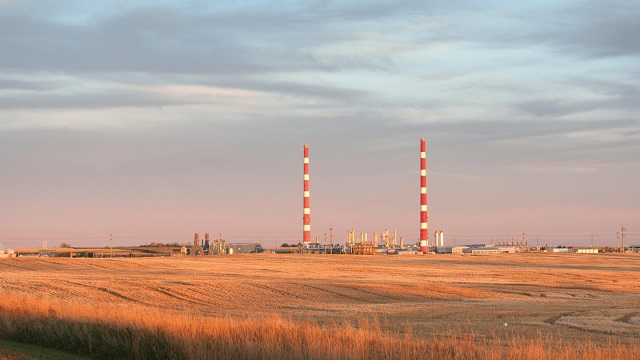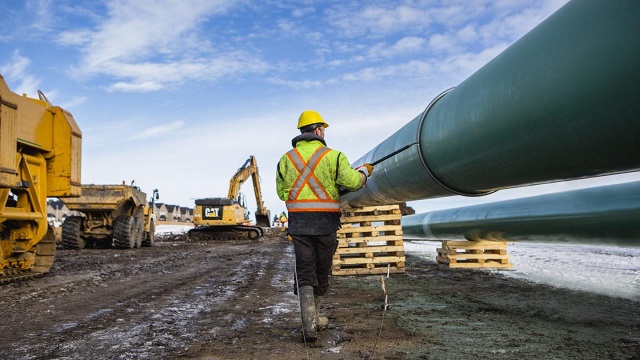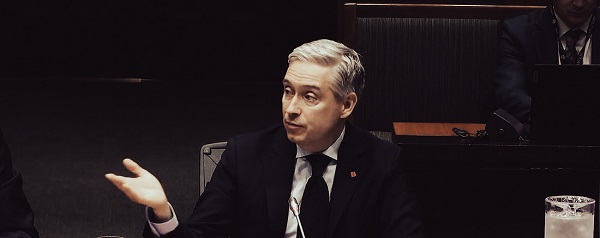Alberta
Five ways Canada’s oil and gas industry showed improved environmental performance in 2023

Natural gas processing facility in Alberta. Photo courtesy Alberta Energy Regulator
From the Canadian Energy Centre
Data shows work industry is doing to reduce its environmental footprint
New data released in 2023 shows the progress Canada’s oil and gas industry is making to reduce its environmental footprint.
From emissions to water use and reclamation, here are some key performance statistics.
1. Methane emissions reduction target achieved three years ahead of schedule
The Alberta Energy Regulator (AER) released data in November showing that oil and gas producers in the province achieved the target of reducing methane emissions by 45 per cent compared to 2014.
The milestone was achieved in 2022, three years ahead of the 2025 government deadline.
Reducing methane emissions comes primarily from reducing small leaks from valves, pump seals, and other equipment, as well as reducing flaring and venting.
2. Oil sands emissions stay flat despite production growth
An updated study by S&P Global in August found oil sands emissions did not increase in 2022 even though production grew.
It’s a significant first that indicates oil sands emissions may start decreasing sooner than previously expected, said Kevin Birn, S&P Global’s vice-president of Canadian oil markets.
Total oil sands emissions were 81 megatonnes in 2022, nearly flat with 2021 despite a production increase of about 50,000 barrels per day.
In 2022, S&P Global predicted peak oil sands emissions around 2025. The new findings indicate it could happen faster.
3. Producers spend millions more than required on oil and gas cleanup
Oil and gas producers in Alberta spent significantly more than required in 2022 cleaning up inactive wells, facilities and pipelines, the AER reported in October.
The regulator’s industry-wide minimum “closure” spend for 2022 was set at $422 million. But the final tally showed producers spent $685 million, or about 60 per cent more than the regulator required.
Industry abandoned 10,334 inactive wells, pipelines and facilities in 2022 – nearly double the amount abandoned in 2019 and 2020, the AER reported.
Reclamation activity also accelerated, with the AER issuing 461 reclamation certificates, an increase of one third compared to 2021.
The regulator reports that 17 per cent of licensed wells in Alberta are now considered inactive, down from 21 per cent in 2019. And about 30 per cent of licensed wells are now considered reclaimed, up from 27 per cent in 2019.
4. Oil sands reclaimed land growing

Wetland in reclaimed area in the Athabasca oil sands region. Photo by Greg Halinda for the Canadian Energy Centre
Data released by Canada’s Oil Sands Innovation Alliance highlights the growing spread of the industry’s reclaimed land.
As of 2021, oil sands operators had permanently reclaimed 10,344 hectares, the equivalent area of more than 20,000 NFL football fields – a 16 per cent increase from 2019.
Of this, 1,296 hectares (about 2,500 NFL football fields) is permanently reclaimed to wetlands and aquatics.
5. Fresh water use per barrel declining
New data on water use in Alberta’s oil and gas industry released in December shows producers continue to reduce the use of fresh water from lakes, rivers and shallow groundwater
The oil and gas industry used less than one per cent of Alberta’s available fresh water in 2022, the AER reported.
Thanks primarily to increased water recycling, fresh water use per barrel in Alberta oil and gas has decreased by 22 per cent since 2013.
Overall, 82 per cent of water used in Alberta oil and gas in 2022 was recycled; 80 per cent in oil sands mining, and 90 per cent in drilled or “in situ” oil sands production.
Alberta
Alberta government’s pipeline proposal reveals truth nature of oil and gas opponents

From the Fraser Institute
Earlier this month, when Alberta Premier Danielle Smith announced that her government, in conjunction with major players in the oilsands, would propose a pipeline to carry Alberta’s products to tidewater off Canada’s west coast, she may have called the Carney government’s bluff (and the bluff of any other government that might be bluffing about pipelines).
In June, the Carney government passed Bill C-5 to purportedly eliminate the gridlock that prevents the construction of major energy infrastructure. But the government’s first list of projects to get the Bill C-5 treatment did not include any oil or gas pipelines (which was no surprise, in light of Canada’s hostile regulatory landscape that deters private-sector companies from investing time and money). In response to Smith’s announcement, federal Natural Resources Minister Tim Hodgson said any proposal for a pipeline must include “meaningful consultations with Indigenous rights holders” and close partnerships with “all affected jurisdictions.”
Meanwhile, in British Columbia, one of those “affected jurisdictions,” Premier David Eby is essentially denying that Smith’s proposal has significant private-sector support, implying it will require federal spending and that it’s a “direct threat to the kind of economy we are trying to build.” And yet, back in June, Eby said he was open to the idea of another privately-funded pipeline to tidewater in northern B.C., noting only that he doesn’t support “tens of billions of dollars in federal subsidy going to build this new pipeline when we already own a pipeline that empties into British Columbia,” referring to the Trans Mountain pipeline. In other words, it sounds like Eby has changed his tune.
In Quebec, Premier François Legault said in February that his government might be open to a proposed oil pipeline (Energy East) from Alberta—“For the moment, there is no project on the table,” he said. “If there is a project on the table, we will look at it.” Fast-forward to today. When asked about Smith’s proposal, leader of the Bloc Quebecois, Yves-François Blanchet (a close ally of Legault’s), said “Let’s imagine that Quebec is an independent and free country. We will go on the world stage to say that Alberta is destroying the environment of the whole planet.”
Clearly, while the federal government and key provincial governments have implied that they’re open to new pipelines (albeit, under an ever-changing roster of conditions), Premier Smith’s proposal has seemingly revealed the truth. They sound like the same implacable opponents of oil and gas development, in submission to the international climate change movement’s zero-tolerance policy for fossil fuels, that have dominated in Canada for a decade.
Alberta
Sheriffs shut down Olds drug house

News release from the Province of Alberta
The Alberta Sheriffs have shut down a problem property where suspected drug activity threatened nearby playgrounds and other community spaces.
The Safer Communities and Neighbourhoods (SCAN) unit of the Alberta Sheriffs obtained a court order against the property owner of 5222 42 Street. The property will be closed for 90 days, beginning on Oct. 7 at noon. All individuals must vacate the premises, including the property owner.
The community safety order, obtained in the Court of King’s Bench, bars all people from the property until the closure period ends on Jan. 5, 2026, and prohibits certain individuals from accessing the property altogether, while the order is in place. The property will be boarded up, fenced and all the locks will be changed. SCAN members will continue to monitor the property for activity while their investigation remains ongoing. Community safety order conditions remain in effect until Jan. 5, 2028.
“SCAN now adds Olds to the long and growing list of Alberta communities that have benefited from its diligent investigative work. My thanks to members of the southern SCAN unit and the RCMP for the closure of another disruptive problem property that posed a risk to nearby playgrounds and the surrounding community and threatened public safety. Criminal activity has no home in our province. I encourage all Albertans to report suspicious activity where and when they see it.”
“Close collaboration with local police was essential for a successful investigation of this property and I thank the Olds RCMP for its partnership on this file. Residents are relieved to see this property close, putting an end to the illegal activities centred around it. Here and across Alberta, SCAN is dedicated to maintaining the peace and safety of neighbourhoods and communities.”
“Olds RCMP remains fully committed to building safer communities by working in partnership with our community as well as through investigative and enforcement efforts to achieve this goal. Olds RCMP would like to thank the Olds RCMP crime reduction member on conducting an excellent investigation and the Alberta Sheriffs SCAN unit for its assistance during this project.”
The Alberta Sheriffs work with other law enforcement agencies to shut down properties being used for illegal activities. The SCAN unit operates under the Safer Communities and Neighbourhoods Act, which uses legal sanctions and court orders to hold owners accountable for illegal activity happening on their property.
Since its inception in 2008, Alberta’s SCAN unit has investigated more than 10,000 properties and has issued more than 135 community safety orders. Most complaints are resolved by working with owners to stop the illegal activity on their property.
Quick facts
- Between February 2022 and May 2025, the RCMP attended the property 65 times for various types of calls for service.
- The RCMP executed three search warrants between January 2024 and April 2025, during which stolen property, illegal drugs and drug paraphernalia were recovered.
- SCAN investigators and the RCMP continued to receive complaints of suspected drug and criminal activities at the property throughout the course of their investigation and observed activity consistent with drug dealing.
-

 COVID-192 days ago
COVID-192 days agoDevastating COVID-19 Vaccine Side Effect Confirmed by New Data: Study
-

 Red Deer1 day ago
Red Deer1 day agoThe City of Red Deer’s Financial Troubles: Here Are The Candidates I Am Voting For And Why.
-

 Business2 days ago
Business2 days agoTrump and Carney full of warm compliments but still no trade deal between Canada and U.S.
-

 Business1 day ago
Business1 day agoCanada Post is failing Canadians—time to privatize it
-

 Haultain Research2 days ago
Haultain Research2 days agoInclusion and Disorder: Unlearned Lessons from Palestinian Protests
-

 Business1 day ago
Business1 day agoGovernment distorts financial picture with definition of capital
-

 Business2 days ago
Business2 days agoFinance Minister ducks deficit questions, talks down to critics, and rebrands reckless spending as ‘transparency’.
-

 COVID-191 day ago
COVID-191 day agoConservative MP slams Freedom Convoy leaders’ sentencing as ‘political persecution’










